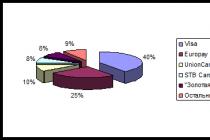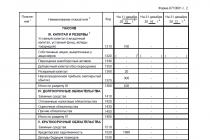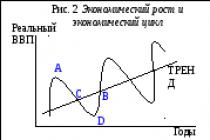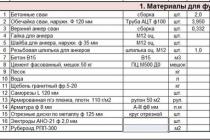What does Russia get from oil and gas exports?
Export of crude oil
2014 - 223.415 million tons - $153.878 billion
2015 - 244.485 million tons - $89.577 billion
Export of petroleum products
2014 - 164.837 million tons - $115.649 billion
2015 - 171.535 million tons - $67.4 billion
Gasoline (as part of petroleum product exports)
2014 - 4.177 million tons - $3.162 billion
2015 - 4.746 million tons - $2.481 billion
Diesel fuel (as part of petroleum product exports)
2014 - 47.399 million tons - $40.803 billion
2015 - 51 million tons - $25.853 billion
Gas export
2014 - 172.6 billion cubic meters - $54.730 billion
2015 - 185.5 billion cubic meters - $41.8 billion
Export of liquefied gas
2014 - 20.5 million cubic meters - $5.244 billion
2015 - 21.4 million cubic meters - $4.546 billion
As you can see, there are losses. But not lethal. We take a calculator, summarize and get the export of all hydrocarbons (crude oil, gas and oil products) for 2015 - $ 203.323 billion.
According to statistics, all exports from Russia in dollar terms decreased by 31.1% (compared to 2014) and amounted to $345.9 billion.
The reason is simple - falling oil prices. If in January 2014 a barrel Brent oil cost about $107, in January 2015 - $50, and in January 2016 already $34. And then Russia smoothed out the unpleasant moment by increasing the extraction and production of petroleum products. Otherwise, the losses would have been greater.
Russia began to increase the production of petroleum products; export not only raw materials, but also finished products.
Based on these figures, it turns out that the share of oil and gas is almost 70% of Russia's total exports.
Surprisingly, the majority stops and fixates on this figure, blaming Russia exclusively for the raw-material model of the economy. For some reason, the opposition does not like to listen further. After all, further figures destroy their "message" - everything is bad in Russia.
Wait a minute, but do we, as a whole country, work exclusively for export?
According to Rosstat, the volume of GDP in 2014 was 77 trillion 893.1 billion rubles, and in 2015 - 80 trillion 412.5 billion rubles ($1325 at an average dollar exchange rate of 60.66).
According to the liberals, Russia's GDP in 2015 for some reason is half as much - $650 billion. It is not known where they got this figure from.
Russia's GDP in 2015 is $1,325 billion. $89.5 billion received from crude oil exports is about 6.8%.
Even if we take the entire hydrocarbon export ($203.323 billion), it is still just over 15% of Russia's GDP.
I agree that low oil prices are at least unpleasant for our country. We rely on this money. But it is not necessary to say that we are completely dependent on oil exports and its prices. Even foreign analysts confirm that Russia, even without receiving any income from the sale of hydrocarbons, will be able to live quietly for 3-4 years, during which the Russian economy can further increase the gap and lose dependence on hydrocarbon exports as much as possible. By at least, Bloomberg experts see huge potential in the Russian economy. And it's hard to disagree with them.
The Cabinet is trying to compensate for losses through "indirect taxes"By 2020, the share of oil and gas revenues federal budget will reach historical low- a third of the state treasury will be tied to raw materials, while in the "best" years for oil and gas, the budget consisted of more than half of the mineral extraction tax, profits from the export of raw materials and oil products. The goal of reducing dependence on hydrocarbons was set by the Russian authorities (at least in words) even before the twofold collapse in oil prices, but the drafted budget can hardly be considered an achievement. Following oil and gas, overall budget revenues are declining, which have to be supported by an increase in the tax burden.
Oil and gas revenues (include MET on hydrocarbons, export duties on oil, oil products and gas), according to the forecast of the Ministry of Finance, in 2017 will amount to 39.4% of total state budget revenues. In 2018, the "raw" share will decrease to 35.9%, in 2019 and 2020. will be 33.7% and 33.4%. In 2018, the state budget will receive 5.479 trillion rubles. (5.6% of GDP) oil and gas revenues at an oil price of $40.8 per barrel. In 2019, the amount will decrease to 5.247 trillion rubles. (5.1% of GDP), plans for 2020 - 5.440 trillion rubles, but as a percentage of GDP, the share is again falling - to 4.9%.
Last year Prime Minister Dmitry Medvedev at a meeting with United Russia, he presented the reduction in the share of oil and gas budget revenues as a merit of the financial authorities:
"The goal is for us to produce products and goods that are able to compete in international markets. If we achieve this, then we will have a different economy. And we are achieving this. Previously, 70% of the budget was revenues from the export of hydrocarbons, and now 45%, which means we can feed ourselves without it. We need to change and take advantage of this situation.".
Strictly speaking, the federal budget never consisted of 70% of oil and gas, at least according to the official version of the extras. Thus, according to the Ministry of Finance, in 2012-2014, raw material items of income had the largest share. - more than 50% and three years ago oil and gas revenues exceeded 51%, taking 10.4% in country's GDP. Then - a period of low oil prices with parallel currency surges. As a result, the loss of an oil trillion in 2016 and a 10% increase in non-oil and gas revenues (however, this is largely due to the “privatization” of Bashneft by the state-owned Rosneft).
In oil and gas revenues, the largest share is MET in the form of hydrocarbons, in 2018 it is 3.547 trillion rubles. Moreover, revenues from the main raw tax in the next two years will fall: by 332.3 billion rubles. in 2018 and by 137.2 billion rubles. - in 2019. In part, the decline will be offset only in 2020. The Ministry of Finance explains the dynamics by price changes (only the cheaper Urals barrel in next year"will take away" 576 billion rubles), the fall in oil and gas production, as well as the adjustment of tax legislation.
In the forecast budget, the decrease in the share of oil and gas revenues is due to the fact that the price of oil is fixed at an underestimated level, while at the same time it is overestimated the economic growth, believes Head of the Institute for Globalization Problems Mikhail Delyagin:"In a situation where we assume that there will be growth at the expense of the non-oil sector, the share of income from it is objectively decreasing. At the same time, there are no signs of plausibility in the forecast, because it is based on things that are not justified in any way.".
Reverse dynamics in non-oil and gas revenues: revenues from income tax, VAT, and excises are increasing. The share of this part of revenues in GDP is growing from 9.7% in 2017 to 9.8% of GDP in 2020. But the growth is caused not only economic dynamics, The government increased a number of pseudo-tax payments: disposal fee rates for agricultural, road and construction equipment (from indexation by 15% to the introduction of new types of fees), and cars(since 2018, a differentiated scale of excises on cars power over 200 hp). In addition, from July 1, 2018, it is planned to lower the threshold for duty-free importation of goods for personal use by individuals, which will affect the cost of purchases.
Note also that the forecast for non-oil and gas revenues is formed taking into account the allocation of 50% of the profits of state-owned companies to dividends. As is known, this standard major players, if Gazprom, Rosneft, Transneft, Rosseti and other companies fulfill the conditions, the budget in 2018 will receive 379.8 billion rubles. dividends, in 2019 - 425.6 billion rubles, in 2020 - 456.9 billion rubles.
The increase in "indirect" taxes, such as excises, is the result of the manipulation of fiscal measures, believes Chief Economist of the Institute stock market and Management Mikhail Belyaev. However, the preponderance towards non-primary income, in his opinion, is evidence that the economy is becoming more diversified and can develop not only at the expense of oil and gas.
"The proof may be the stabilization of the ruble exchange rate against convertible Western currencies, primarily against the dollar. It fluctuates quite strongly, but around a certain value and often in a phase opposite to oil price movements. In addition, Rosstat points to positive economic growth rates in the first half of the year. Everything suggests that the economy has entered the positive zone, it did it just at the expense of non-oil and gas industries. I believe that this is a trend, it is becoming clear and visible", - said Belyaev.
However, it was not possible to fully replace the oil and gas rubles, the proof of this is decline in income relative to GDP from 16% in 2017 to 14.8% in 2020 The dynamics is connected "with a reduction in the share of the oil and gas sector against the backdrop of lagging growth in physical volumes of production and exports," the Ministry of Finance admits. The completion of the OPEC deal will also have an effect: Urals prices will reach the $40 trajectory by the end of 2018.
The percentage of oil and gas revenues in the state budget, as seen in the graph below, still depends not on the efforts allegedly made by the Government to diversify the economy, but on the cost of oil. Petrodollars form stocks, depend on them tax policy and politics in general. As a result - budget-2018 in its structure is almost a complete reflection of the treasury of the middle of the "zero".
Fund resources national welfare, which next year will absorb reserve fund, appear among the sources of financing the deficit in 2018, starting from 2019, the "pod" will be sealed. The decision is explained by the fact that it is not possible to accumulate excess profits from raw materials in the period of their absence. At the beginning of 2016, there were 5.227 trillion rubles in the NWF, by the end of 2017, according to the forecasts of the Cabinet of Ministers, 3.901 trillion rubles will remain there. In 2018, it is expected decrease in the volume of funds of the National Welfare Fund to 3.756 trillion rubles. due to the direction of 1.113 trillion rubles. to cover the deficit and generate funds pension fund. At the same time, additional oil and gas revenues that will go to the National Welfare Fund are estimated at 716 billion rubles. in 2018 and 547.1 billion rubles. - in 2019. Over the years, only 8.2 billion rubles will be spent from the NWF. for the formation of pensions.
The oil and gas deficit of the federal budget will decrease from 9.1% in 2016 to 5.8% of GDP in 2020.
"De facto budgetary policy since February current year carried out in accordance with transitional provisions budget rules. Additional oil and gas revenues received in 2017 cannot be used to finance budget expenditures. The results of such a policy have already been a decrease in the dependence of exchange rate dynamics on oil prices and the strengthening of investor confidence in the policy pursued", - noted in the documents to the draft budget for 2018-2020.
Recall that the State Duma is a draft law on the distribution of oil and gas revenues among the Russians. The authors, deputies of the Communist Party faction, propose in 2018. The Communists are sure that the fall in raw materials income is not the reason for abandoning the initiative.
"Look at oil quotes - the price is rising. We'll get additional income that the authorities want to invest in the American economy. Let me remind you that the “box”, where the income will be deposited, is nominated in petrodollars. We consider such a policy to be fundamentally wrong, petrodollars should serve to revive the Russian economy.Now the budget as a whole is cutting spending, but at the same time 38% is spent on defense and security, and on Agriculture- 1.5% is a continuation of the budgetary policy aimed at killing our own economy. How can we talk about reducing dependence on raw materials if the budget policy itself is formed based on dollar oil prices and the size of the dual-currency basket? The economy remains dependent- shared his opinion with State Duma deputy from the Communist Party Nikolay Kolomeytsev.
It is not only communists who want to "take away" income from the state treasury. The day before, the Ministry of Finance was offered to give part of non-oil and gas revenues from excises to the regions. In particular, it was about crediting to the budgets of subjects of revenues from excises on strong alcohol and tobacco, revenues from fuel surcharges. However, in the context of the struggle to reduce the federal budget deficit, the senators' request is unlikely to be heard in the coming years.

The crisis state of the domestic economy is currently worrying almost everyone. People see how prices and tariffs are rising, how salaries are not keeping up with them. They explained to us that the state of our economy is responding to the fall in oil prices. Why does the economic situation in Russia depend on "oil" prices?
The dependence of the Russian economy on oil and gas
Russia is one of the world's largest oil and gas producing countries. Accordingly, a significant part of the budget revenues come from the oil and gas industry. In addition, the extraction of these minerals in 2014 was over 10 percent of GDP, and the share of oil and natural gas exports from Russia reached 44%. That is, the fullness of the country's budget and, in general, the state of our economy and its further development depend on the production and sale of energy resources.
Some experts say that Russia is still not a country focused only on the export of raw materials, and the impact of "oil" prices on the country's economic growth is too exaggerated. Other experts emphasize that Russia is still in a strong "raw" dependence.
One way or another, recent events show that the decline in world oil prices still had an impact on the current economic state of the country. In particular, we are all witnessing an increase in inflation, a fall in real incomes of the population, and at the heart of all this is the weakening of the ruble.
Weakening factors Russian currency
The exchange rate of the Russian currency is not a very predictable thing. Many factors affect the ruble, they affect its exchange rate to varying degrees of intensity and change over time. Currently, the strongest influence on the ruble exchange rate was provided by “oil” prices, sanctions and an increase in key rate TSB RF. And these factors, as experts believe, will continue to exert their influence in the near future.
In addition, the weakening of the Russian currency is now facilitated by the recession observed in the economy, high rates inflation and the continuing decline in oil prices.
The dependence of the Russian economy on the price of oil
This dependence is rooted in the structure of our economy. A fairly large share of the country's budget revenues comes from the oil and gas sector - according to experts, up to half of the federal budget revenues and 30% of Russia's consolidated budget. When calculating the country's budget, the authorities rely on the forecast oil price. And if it turns out to be lower than the predicted level, as it has been happening lately, the budget suffers huge losses in the revenue side, since the proceeds from the sale of energy carriers turn out to be lower than expected.
The lack of income leads to a budget deficit, a decrease in the level of investment in the economy, which hinders its development, stimulates inflation and leads to a general crisis.
The current situation can be changed by developing the country's domestic economy, supporting small and medium-sized businesses, and developing other sectors of the economy. All this requires economic reform, removal of administrative barriers, improvement of the business environment and investment climate - a long and difficult work, the results of which will be visible only in a few years. But at the moment, the Russian economy really depends on oil prices, although perhaps not to such a strong extent, as pessimistic experts believe.
Mezentseva Vasilisa
Opinions on the degree of dependence of the Russian economy on the export of hydrocarbons differ greatly. This is because such judgments often have hidden political overtones. Some argue that the country's wealth is based almost entirely on oil and gas revenues. Others insist that Russian economy is sufficiently diversified, so the export of hydrocarbons does not play a critical role in maintaining its stability. Different methods for determining the structure of the budget give conflicting information about what share it is made up of revenues received from
Commodity economy
Some resource-rich countries choose to take the easy route and focus on the development of extractive industries. Such economic policy causes ambiguity. The standard reproach against the states with the so-called commodity economy boils down to the fact that instead of investing in high-tech production, they rely on Natural resources which may be exhausted in the foreseeable future.
The importance of innovation and industrial upgrading is undeniable. However, it is worth asking how much confidence should be given to predictions about the depletion of the world's mineral reserves. First of all, this applies to hydrocarbons, without which modern civilization is unthinkable.
World reserves of black gold
About 60 years ago, the peak oil theory became widely known. She argued that at the beginning of the 21st century, humanity will face a global shortage of black gold. This prediction did not come true because the research underlying it did not take into account the inventions of new mining methods.
The failed prediction called into question the possibility of calculating the time of the world hydrocarbon peak. We can only say with certainty that someday the oil reserves will be exhausted, since it is a report published international agency on energy, contains the following conclusion: the global reserves of black gold are large, but not eternal.

The role of hydrocarbon exports
To understand whether the domestic economy is really in a hopeless dependence on the every second changing quotes of world exchanges, it is necessary to objectively assess the share of oil in the Russian budget. Comparative analysis the income structure of the countries on the list of the world's main energy suppliers will help create a picture that is as close to reality as possible.
If we take as a criterion not the share of oil in the Russian budget, but the number of exported barrels per capita, then it turns out that in this rating the first lines are occupied by such states as Qatar, Kuwait, and Norway. RF according to this indicator is in 22nd place.
In order to compare the percentage of oil in with the same value in other hydrocarbon-rich countries, it is necessary to choose the most objective calculation method. Some argue that the energy sector provides about half of the country's income. This figure is based on official data, but does not reflect the real state of affairs. When it comes to oil revenues in the Russian budget, its complex structure should be taken into account. In addition, there are certain subtleties in the terminology that the Ministry of Finance uses in its reports.

Consolidated Income
A realistic assessment of the extent to which Russia's budget depends on oil must be based on comprehensive information. Only taking into account the consolidated income of the state, it is possible to determine what role energy exports play in the economy. According to official reports, the contribution of the hydrocarbon industry is about 20% of tax revenues. This figure strongly disagrees with statements that the share of oil in the Russian budget reaches 50%. The reason for this discrepancy lies in the financial system countries.
The federal budget, in which the share of oil really reaches 50%, cannot serve as an indicator of the total volume of state revenues. It does not include insurance premiums, as well as a significant portion of corporate taxes and individuals. AT consolidated income RF, which reflects the real economic situation, the share of hydrocarbon exports is approximately two times lower than in the federal budget.

The collapse in energy prices
The consequences of the catastrophic fall in the price of black gold that occurred in 2014 demonstrate in practice the degree of influence of the commodity sector on general welfare countries. They confirm that the share of oil in the Russian budget plays an important but not critical role. The onset of a period of low prices for hydrocarbons led to a collapse in the exchange rate national currency, however, the main indicators of the domestic economy look quite acceptable.
Last year turned out to be the least profitable from the sale of oil and gas - only 35.9% of total revenues. If in January-February 2016 the country's budget received 687.7 billion rubles from raw materials, then for the same period in 2017 it was already 1 trillion rubles, which is 20% lower than in 2014, but 4% more than in 2013 G.

It is gratifying that non-oil and gas revenues grew despite the global situation on the raw materials market. Last year, out of 13.5 trillion rubles, they accounted for 8.6 trillion rubles - the best indicator for modern history. Only thanks to them, the total revenues of the Russian budget managed to stay above the mark of 13 trillion rubles.
However, as soon as oil prices go higher, the share of oil and gas revenues will begin to grow. Since our country has significantly increased the production of "black gold", even if its quotes reach the mark of $65 per barrel, oil and gas revenues to the budget will block non-oil and gas ones.
With regard to the expenditure side of the budget, significant growth occurred in the cost of social policy and national defense - 412 and 73 billion rubles respectively. But health care costs fell by as much as 2 times by 30 billion rubles.
Summary
The growth of oil and gas revenues, in our opinion, will be significantly limited in the coming years, and this is due not only to low prices for oil, but also . Therefore, most likely, their share over time will be less and less.
Might be interesting:














